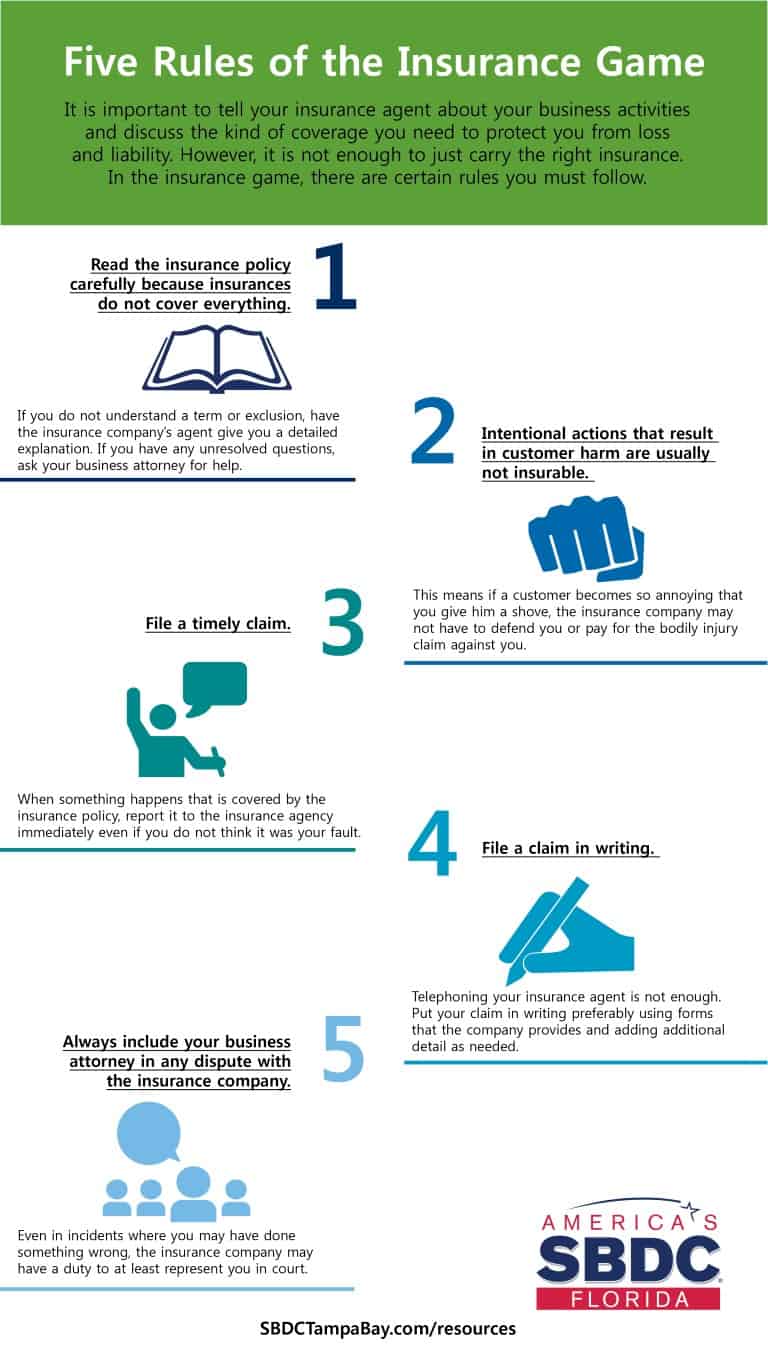Five Rules of the Insurance Game
Insurance has been around for a long time. Two thousand years ago, the Greeks and Romans had a form of cargo insurance. In the early 1700s, Lloyds of London became known for its maritime insurance. In 1752, Benjamin Franklin brought property insurance to America. The concept is simple: For a price, the insurance company will guarantee you against loss if you play by the rules.
Most entrepreneurs have insurance before they go into business and are familiar with the two types: First party insurance that protects them from loss (fire, health, life insurance) and third party insurance that defends them from claims by others and pays the claims if the defense is unsuccessful. The liability portion of car insurance is an example of third party insurance.

Many entrepreneurs know that when starting a business their personal insurance policies will not be enough. They recognize they need some or all of the following insurance coverage depending on the type of business they are operating: Business Property Insurance, Business Interruption Insurance, Liability Insurance, Auto Insurance, and maybe Professional Liability and Workers’ Compensation. It is important to tell your insurance agent about your business activities and discuss the kind of coverage you need to protect you from lose and liability.
However, it is not enough just to carry the right insurance. In the insurance game, there are certain rules you must follow. They are:
- Read the insurance policy carefully because insurances do not cover everything. The insurance policy will specify what the insurance company will cover and what is excluded. If you do not understand a term or exclusion, have the insurance company’s agent give you a detailed explanation. If you have any unresolved questions, ask your business attorney for help.
For example, the normal homeowner’s insurance policy will exclude liability from business activities conducted on the premises — commonly claims by customers who are injured on the homeowner’s property while doing business. That means if a customer meets you at your home to transact business (even just dropping off documents) and trips on the front step breaking her ankle, you could be paying for her medical bills and pain and suffering out of the company till or, possibly, your own pocket. If you are going to transact any business on your home property, tell the insurance agent so that he can issue a rider on the homeowner’s insurance policy or sell you a new, business specific, policy.
An exclusion of a Business Liability policy may be the economic harm you suffer because a product you produce is defective. The reasoning is simple. You are in control of the quality of your product but if you were insured against losing money because of poor workmanship there would be little incentive to produce a quality product. - Intentional actions that result in customer harm are usually not insurable. This means if a customer becomes so annoying that you give him a shove, the insurance company may not have to defend you or pay for the bodily injury claim against you.
- File a timely claim. When something happens that is covered by the insurance policy, report it to the insurance agency immediately even if you do not think it was your fault or the customer or vendor assures you they have insurance that will cover the occurrence.One of my businesses was having their roof repaired when the self-insured subcontractor tumbled off the roof, breaking his arm. He assured the business owner that he had insurance and not to worry. Unfortunately, the business owner took his advice and didn’t. Nine months later the business owner was served with a notice to appear in court on a million-dollar liability claim. The business immediately sent a letter to the insurance company reporting the incident. The insurance company denied coverage and the appeals court sided with the insurance company.
- File a claim in writing. Telephoning your insurance agent when an incident occurs is not enough. Put your claim in writing preferably using the forms that the company provides and adding additional details as needed. While not required by law, a wise practice is to make copies of every document for your records and send the originals by registered mail. If you scan and email documents, ask the insurance company to confirm by email when they received them. Many an email document has disappeared forever into cyberspace.
- Always include your business attorney in any dispute with the insurance company. Even in incidents where you may have done something wrong, the insurance company may have a duty to at least represent you in court. Your own attorney can examine your policy and advise you regarding your course of action.
In business, as in life, bad things sometimes happen. However, good insurance and careful reporting can eliminate or at least soften their financial impact. Occasionally, the insurance company may drop the ball and not do a good job. Keeping your business attorney in the loop is one way to protect your rights.




